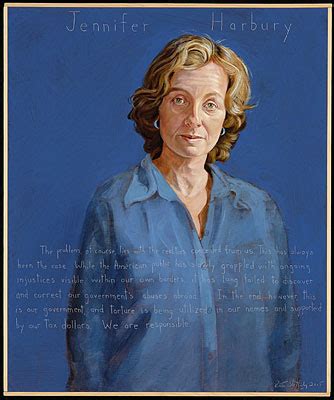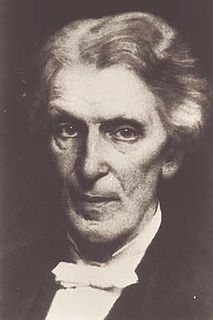A Quote by Charles Caleb Colton
He that abuses his own profession will not patiently bear with any one else who does so. And this is one of our most subtle operations of self-love. For when we abuse our own profession, we tacitly except ourselves; but when another abuses it, we are far from being certain that this is the case.
Related Quotes
In your whole life nobody has ever abused you more than you have abused yourself. And the limit of your self-abuse is exactly the limit that you will tolerate from someone else. if someone abuses you a little more than you abuse yourself, you will probably walk away from that person. But if someone abuses you a little less than you abuse yourself, you will probably stay in the relationship and tolerate it endlessly.
Subjecting prisoners to abuse leads to bad intelligence, because under torture a detainee will tell his interrogator anything to make the pain stop. Second, mistreatment of our prisoners endangers U.S. troops who might be captured by the enemy – if not in this war, then in the next. And third, prisoner abuses exact on us a terrible toll in the war of ideas, because inevitably these abuses become public.
The problem, of course, lies with the realities concealed from us. This has always been the case. While the American public has slowly grappled with ongoing injustices visible within our own borders, it has long failed to discover and correct our government's abuses abroad. In the end, however, this is our government, and torture is being utilized in our names and supported by our tax dollars. We are responsible.
Does the open wound in another's breast soften the pain of the gaping wound in our own? Or does the blood which is welling from another man's side staunch that which is pouring from our own? Does the general anguish of our fellow creatures lessen our own private and particular anguish? No, no, each suffers on his own account, each struggles with his own grief, each sheds his own tears.
We who are in the arts are at the risk of being in a popularity contest rather than a profession. If that fact causes you despair . . . pick another profession. Your desire to communicate must be bigger than your relationship with the chaotic and unfair realities . . . We have to create our own standards of discipline.
If human life is in fact ordered by a beneficent being whose knowledge of our real needs and of the way in which they can be satisfied infinitely exceeds our own, we must expect a priori that his operations will often appear to us far from beneficent and far from wise, and that it will be our highest prudence to give him our confidence in spite of this.
Perhaps that is our doom, our human curse, to never really know one another. We erect edifices in our minds about the flimsy framework of word and deed, mere totems of the true person, who, like the gods to whom the temples were built, remains hidden. We understand our own construct; we know our own theory; we love our own fabrication. Still . . . does the artifice of our affection make our love any less real?
In a very real sense not one of us is qualified, but it seems that God continually chooses the most unqualified to do his work, to bear his glory. If we are qualified, we tend to think that we have done the job ourselves. If we are forced to accept our evident lack of qualification, then there's no danger that we will confuse God's work with our own, or God's glory with our own.
Most people think of love as some sort of power outside of themselves that will "take them away from all of this." Sadly, this is not the case. Love exists only within our own hearts, and to have happy relationships we must first become truly loving people. And as we fill our hearts with love by expressing love for others in thought, word, and deed ("acting as if" until we make it happen if necessary), that love can heal our own lives, help to solve our problems, and enable us to feel good about ourselves.
Can I pay any higher tribute to a man [George Gaylord Simpson] than to state that his work both established a profession and sowed the seeds for its own revision? If Simpson had reached final truth, he either would have been a priest or would have chosen a dull profession. The history of life cannot be a dull profession.
We cannot embrace His cross, and yet refuse our own. We cannot raise the cup of His remembrance to our lips, without a secret pledge to Him, to one another, to the great company of the faithful in every age that we, too, hold ourselves at God's disposal, that we will ask nothing on our own account, that we will pass simply into the Divine hand to take us whither it will.
We have the need to be accepted and to be loved by others, but we cannot accept and love ourselves. The more self-love we have, the less we will experience self-abuse. Self-abuse comes from self-rejection, and self-rejection comes from having an image of what it means to be perfect and never measuring up to that ideal. Our image of perfection is the reason we reject ourselves the way we are, and why we don't accept others the way they are.



































